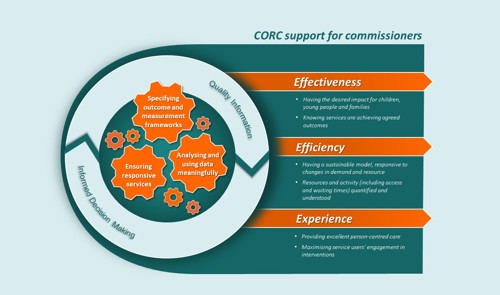Balancing the three-legged stool: effective outcomes-based commissioning
Recent discussions and projects with commissioning colleagues around the country have highlighted that contracting against outcomes, and effectively monitoring them, is still an area of mixed practice and success for many localities across the child, young person and family sector.
The journey towards “Outcome Based Commissioning”, despite being on the agenda for some time, is lengthy, with key elements needing to be in place before the whole system can work cohesively. CORC have dedicated much time to understanding what the key ingredients are. We see it as a three-legged stool: it needs at least 3 legs to keep it from wobbling.
- Effectiveness: there is the need to know that services are achieving agreed outcomes, or to put it another way, they are having the desired impact upon the target population.
- Efficiency: quantifying activity such as access and waiting times is important to make sure that the model of delivery is sustainable, and services need to be in a position to be responsive as demand and resources fluctuate.
- Experience: excellent, person-centered care is needed to ensure maximum service user engagement in the intervention being offered - both for its own sake, and because it contributes to the achievement of good outcomes.
Information around these three things will help any commissioner to know ‘Are we delivering the right services, at the right time AND getting value for money?”. But it’s not always an easy balance to strike with the ‘go to’ solution sometimes being to develop complicated, often uncoordinated, performance management frameworks that require larger amounts of data from providers to be produced in varying formats.
With ever increasing demand on budgets and time, the capacity, capability and sheer good will of services to provide the required data will be finite if it is not seen to be driving improvement decisions. Whilst writing outcomes and their subsequent measurement into contracts helps address some of these issues, it does not guarantee service buy-in to providing data: challenges in getting quality information collected and flowed will remain where this is seen as a top down, management task with no meaningful impact.
At a recent conference, a colleague spoke about how we need to start following data through to its conclusion. This should be to provide insight, understanding and eventually wisdom to convert into real-world improvements. Closing this feedback loop, with emphasis being on how the data has helped to evaluate impact and demonstrate value for money, is imperative if services are to see a shared benefit in developing a framework where quality data is integral.
Because of this challenge, CORC are working with more commissioners and services to make sure that the stool is balancing; that the right types of information are being requested at the right time to measure the right elements of the whole system, whilst ensuring the data is analysed consistently and that intelligence is used wisely. Simple! Right?
Perhaps it is…The first and foremost challenge on this road to excellent outcomes is for local areas / commissioning footprints to understand where they are currently: what is in place, what is well embedded and works, what is missing and what needs to be improved? To demystify what the key elements and methodologies are for a healthy, outcome-focused system, CORC have developed a model to demonstrate best practice and help guide the way. This holistic model does not just focus on how to measure and how to get more data; it helps to think through:
- What are good, local, shared outcomes?
- How is it best to measure these outcomes?
- What support do services need to provide the data for this measurement?
- How is that data then used to complete the cycle of continuous improvement?
To find out more about the work we are doing with commissioners, please do visit the commissioner pages on our website.
CORC Support for Commissioners
By Sally Marriott, CORC Regional Officer
